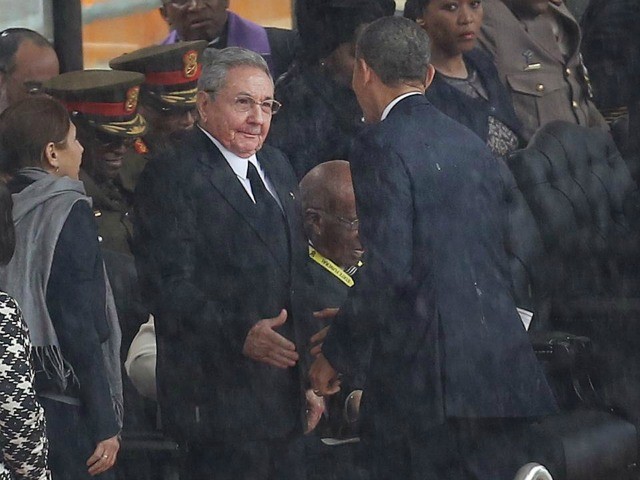
President Obama’s warm greeting to Cuban dictator Raúl Castro at Tuesday’s memorial for Nelson Mandela rightfully sparked the ire of those with a passion for human rights. In greeting Castro, Obama discredits the work of dissidents Castro routinely arrests and assaults.
The handshake triggered visceral reactions across the political spectrum. On the left, many heralded it as indicative of the power Nelson Mandela had to bring about peace (despite half a lifetime’s embrace of violence). On the right, revulsion: the President of the United States exchanged a peaceful gesture with a brutal mass murder and oppressive tyrant, never once showing that same warmth to the dissidents that peacefully call for change in their country.
For many, especially those that see no issue with a such an approving gesture at a funeral, it is difficult to understand the greater meaning of accepting Castro as an equal. This is especially true without looking at Castro’s opposition–that is, at the people whose plight President Obama willfully ignores and whose oppression he embraces as he embraces their oppressor. To that end, below are five of profiles of dissidents on the island with whom President Obama should interact and whose missions he should bolster–political activists seeking to liberate their country from oppression.
1. Guillermo Fariñas
Often denominated “Cuba’s Mandela,” Guillermo Fariñas does not share the history of early violence or support of oppressive dictatorships abroad with the late South African leader. Fariñas, a Sakharov Prize winner, made his name through his 24 hunger strikes in jail, where few of his supporters expected to see him live. Live he did, and he visited the United States and met President Obama while here. He demanded one thing of the President: “don’t negotiate with Cuba.”
Fariñas returned to the island after his voyage abroad and was arrested and beaten by state police again shortly thereafter.
2. Jorge Luis Garcia Pérez (Antúnez)
Antúnez is perhaps the second highest-profile Cuban dissident on the island after Fariñas. He rose to prominence in 2007 after serving 17 years in Castro’s political gulags for spreading “enemy propaganda.” He is a great admirer of American civil rights leaders, and his wife founded the Rosa Parks Movement in Cuba.
Antúnez has been significantly more critical of President Obama than Fariñas, telling the Heritage Foundation that he was alarmed by the fact that “the government of Mr. Barack Obama has exercised a political agenda of approach and relaxation with the regime of Havana.” He did not receive an audience with the President on his visit to the United States this autumn but did meet Cuban-American senators Marco Rubio and Bob Menendez, as well as Florida Senator/honorary Cuban Bill Nelson.
3. The Ladies in White
Also Sakharov Prize winners, the Ladies in White (Damas de Blanco) are a coalition of mothers, wives, sisters, and daughters of Cuban political prisoners. Led by Berta Solér since the death of widely recognized dissident leader Laura Pollán, the group highlights the struggles of women left behind to fare in the socialist dystopia while their husbands toil in jail for thoughtcrimes.
Solér and the Ladies visited the United States recently as well, only to be told by President Obama that he could see “changes” in the Cuban government that they apparently had missed.
4. Gorki Águila
Unlike any other dissidents on this list, Gorki Águila is not exactly a political figure. He is the lead singer of a punk rock group dedicated to fighting communism with profane anti-establishment lyrics. Porno Para Ricardo (the name meaning “censored pleasure for the individual“) boasts songs with titles like “El Comandante,” “I Don’t Like Politics (But Politics Likes Me),” and “How To Fuck Over A Communist.” Needless to say, Águila is perennially the victim of police beatings and arrests for his outrageous music, the kind of antics that would make him a beloved star in the States.

COMMENTS
Please let us know if you're having issues with commenting.